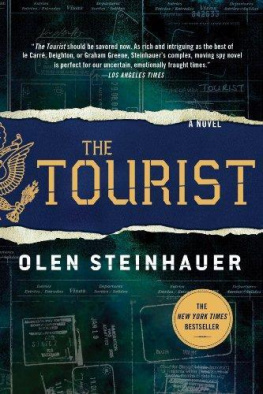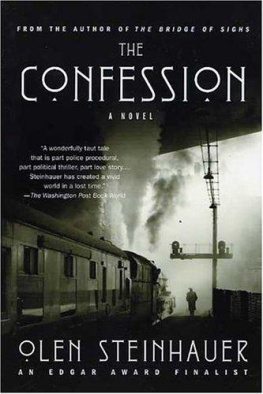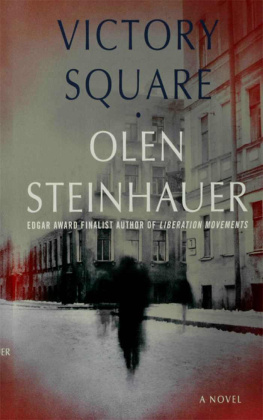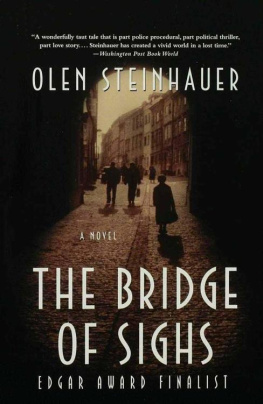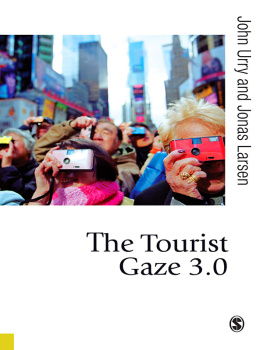The
TOURIST
OLEN STEINHAUER
M i n o t a u r B o o k s
N e w Y o r k
The
END of TOURISM
M O N D A Y , S E P T E M B E R 1 0 , T O T U E S D A Y , S E P T E M B E R 1 1 ,2 0 0 1
Four hours after his failed suicide attempt, he descended toward Aerodrom Ljubljana. A tone sounded, and above his head the seat belt sign glowed. Beside him, a Swiss businesswoman buckled her belt and gazed out the window at the clear Slovenian sky--all it had taken was one initial rebuff to convince her that the twitching American she'd been seated next to had no interest in conversation.
The American closed his eyes, thinking about the morning's failure in Amsterdam--gunfire, shattering glass and splintered wood, sirens. If suicide is sin, he thought, then what is it to someone who doesn't believe in sin? What is it then? An abomination of nature? Probably, because the one immutable law of nature is to continue existing. Witness: weeds, cockroaches, ants, and pigeons. All of nature's creatures work to a single, unified purpose: to stay alive. It's the one indisputable theory of everything.
He'd dwelled on suicide so much over the last months, had examined the act from so many angles, that it had lost its punch. The infinitive clause
"to commit suicide" was no more tragic than "to eat breakfast" or "to sit," and the desire to snuff himself was often as strong as his desire "to sleep." Sometimes it was a passive urge--drive recklessly without a seat belt; walk blindly into a busy street--though more frequently these days he was urged to take responsibility for his own death. "The Bigger Voice," his mother would have called it: There's the knife; you know what to do. Open thewindow and try to fly. At four thirty that morning, while he lay on top of a woman in Amsterdam, pressing her to the floor as her bedroom window exploded from automatic gunfire, the urge had suggested he stand straight and proud and face the hail of bullets like a man.
He'd spent the whole week in Holland, watching over a sixty-year-old U.S.-supported politician whose comments on immigration had put a contract on her head. The hired assassin, a killer who in certain circles was known only as "the Tiger," had that morning made a third attempt on her life. Had he succeeded, he would have derailed that day's Dutch House of Representatives vote on her conservative immigration bill. How the continued existence of one politician--in this case, a woman who had made a career of catering to the whims of frightened farmers and bitter racists--played into the hands of his own country was unknown to him. "Keeping an empire," Grainger liked to tell him, "is ten times more difficult than gaining one."
Rationales, in his trade, didn't matter. Action was its own reason. But, covered in glass shards, the woman under him screaming over the crackling sound, like a deep fryer, of the window frame splintering, he'd thought, What am I doing here? He even placed a hand flat on the wood-chip-covered carpet and began to push himself up again, to face this assassin head-on. Then, in the midst of all that noise, he heard the happy music of his cell phone. He removed his hand from the floor, saw that it was Grainger calling, and shouted into it, "What?"
"Riverrun, past Eve," Tom Grainger said.
"And Adam's."
Learned Grainger had created go-codes out of the first lines of novels. His own Joycean code told him he was needed someplace new. But nothing was new anymore. The unrelenting roll call of cities and hotel rooms and suspicious faces that had constituted his life for too many years was stupefying in its tedium. Would it never stop?
So he hung up on his boss, told the screaming woman to stay where she was, and climbed to his feet...but didn't die. The bullets had ceased, replaced by the whining sirens of Amsterdam's finest.
"Slovenia," Grainger told him later, as he drove the politician safely to the Tweede Kamer. "Portoroz, on the coast. We've got a vanished suitcase of taxpayer money and a missing station chief. Frank Dawdle."
"I need a break, Tom."
"It'll be like a vacation. Angela Yates is your contact--she works out of Dawdle's office. A familiar face. Afterward, stay around and enjoy the water."
As Grainger droned on, outlining the job with minimal details, his stomach had started to hurt, as it still did now, a sharp pain. If the one immutable law of existence is to exist, then does that make the opposite some sort of crime?
No. Suicide-as-crime would require that nature recognize good and evil. Nature only recognizes balance and imbalance.
Maybe that was the crucial point--balance. He'd slipped to some secluded corner of the extremes, some far reach of utter imbalance. He was a ludicrously unbalanced creature. How could nature smile upon him?
Nature, surely, wanted him dead, too.
"Sir?" said a bleached, smiling stewardess. "Your seat belt." He blinked at her, confused. "What about it?"
"You need to wear it. We're landing. It's for your safety." Though he wanted to laugh, he buckled it just for her. Then he reached into his jacket pocket, took out a small white envelope full of pills he'd bought in Dusseldorf, and popped two Dexedrine. To live or die was one issue; for the moment, he just wanted to stay alert.
Suspiciously, the Swiss businesswoman watched him put away his drugs.
________
The pretty, round-faced brunette behind the scratched bulletproof window watched him approach. He imagined he knew what she noticed--how big his hands were, for example. Piano-player hands. The Dexedrine was making them tremble, just slightly, and if she noticed it she might wonder if he was unconsciously playing a sonata.
He handed over a mangled American passport that had crossed more borders than many diplomats. A touring pianist, she might think. A little pale, damp from the long flight he'd just finished. Bloodshot eyes. Aviatophobia--fear of flying--was probably her suspicion. He managed a smile, which helped wash away her expression of bureaucratic boredom. She really was very pretty, and he wanted her to know, by his expression, that her face was a nice Slovenian welcome. The passport gave her his particulars: five foot eleven. Born June 1970--thirty-one years old. Piano player? No--American passports don't list occupations. She peered up at him and spoke in her unsure accent: "Mr. Charles Alexander?"
He caught himself looking around again, paranoid, and gave another smile. "That's right."
"You are here for the business or the tourism?"
"I'm a tourist."
She held the open passport under a black light, then raised a stamp over one of the few blank pages. "How long will you be in Slovenia?" Mr. Charles Alexander's green eyes settled pleasantly on her. "Four days."
"For vacation? You should spend at least a week. There is many things to see."
His smile flashed again, and he rocked his head. "Well, maybe you're right. I'll see how it goes."
Satisfied, the clerk pressed the stamp onto the page and handed it back.
"Enjoy Slovenia."
He passed through the luggage area, where other passengers from the Amsterdam-Ljubljana flight leaned on empty carts around the still-barren carousel. None seemed to notice him, so he tried to stop looking like a paranoid drug mule. It was his stomach, he knew, and that initial Dexedrine rush. Two white customs desks sat empty of officials, and he continued through a pair of mirrored doors that opened automatically for him. A crowd of expectant faces sank when they realized he didn't belong to them. He loosened his tie.
The last time Charles Alexander had been in Slovenia, years ago, he'd been called something else, a name just as false as the one he used now. Back then, the country was still exhilarated by the 1991 ten-day war that had freed it from the Yugoslav Federation. Nestled against Austria, Slovenia had always been the odd man out in that patchwork nation, more German than Balkan. The rest of Yugoslavia accused Slovenes--not without reason--of snobbery.
Next page
